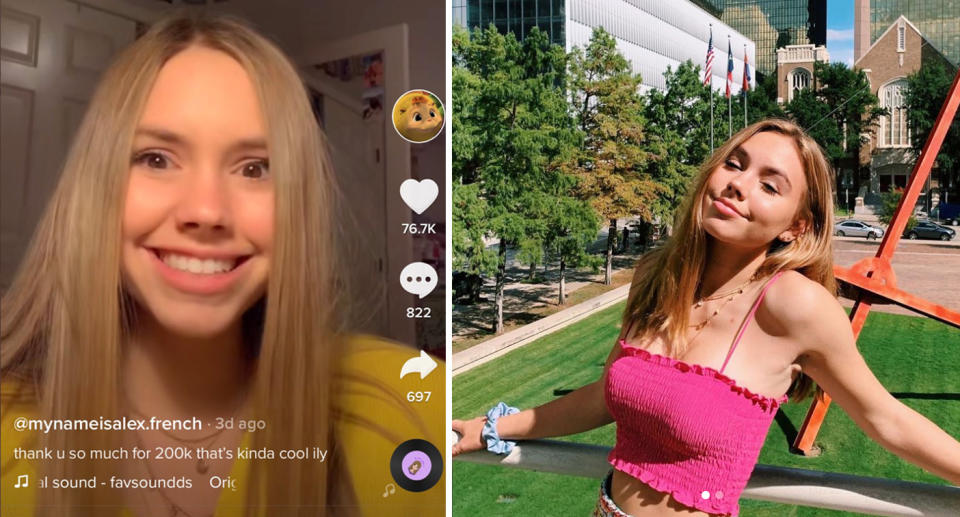The dark side behind new Tiktok star amassing millions of followers
You almost certainly haven’t heard of her, but a new star was born this week – at least in one unique corner of the internet.
An American teen named Alex French sent social media into meltdown after gaining nearly a million followers in 24 hours on popular video sharing app TikTok.
Owned by Chinese technology company Bytedance since 2017, the app provides tools for users to easily edit and share clips and potentially reach millions of users. Popular among tweens, it has led to a new crop of internet creators, such as Alex who appears to be just a regular teen living in Texas.
As inexplicable as it may be, young users like her are able to gain a massive followings and an instant audience in the tens of thousands if they strike the right note – just so long as they play by the rules of the Chinese Communist Party, that is.
As the platform has amassed a huge user base (three months after launching in Australia in May, it boasted more than 1.4 million monthly active users across Australia and New Zealand), it has also prompted warnings about the darker side of the app and how it operates.

To the outsider, there appears to be little rhyme or reason for the meteoric rise in popularity some users on the platform enjoy, and that seems to be half the fun.
The video that helped take Alex from 300,000 followers early this week to 1.7 million at the time of writing, was just a compilation of her saying “hi” in different outfits.
“These overnight fame surges seem to be pretty random, but that's what makes this so fun!” Buzzfeed wrote this week in a piece explaining who Alex was.
“Who knows who we'll be writing about next week ... It could be you.”
In the fast moving world of social media, TikTok is the cool new kid on the block. The app was downloaded more time that Facebook and Instagram in 2018 as it shot to the top of the charts.
But behind the stories of overnight fame are more troubling stories of predatory teen sex and dating scams, revelations that content posted by people with disabilities was being suppressed by the platform’s algorithm, and accusations of Chinese government censorship and Communist Party propaganda.
A report released last week by the Australian Strategic Policy Institute stated that TikTok's parent company ByteDance “collaborates with public security bureaus across China, including in Xinjiang where it plays an active role in disseminating the party-state's propaganda”.
This is the Alex French video that helped get her going and ppl reference pic.twitter.com/STDic0BdMl
— Taylor Lorenz (@TaylorLorenz) December 2, 2019
The company behind the app was also fined $US5.7 million ($A8.32 million) in February for collecting data on child users under the age of 13. Despite the fine, a class action lawsuit was launched Wednesday (AEST) in the US accusing the company of continuing to harvest data on child users.
After a user was recently kicked off the platform for criticising China’s treatment of its minority Uighur population in a video that tried to hide the criticism in what appeared as a make-up tutorial video, broader concerns about how the app operates made their way to the Australian parliament.
Australian MP warns on danger of TikTok
Rightly or wrongly, there are always concerns when large social media companies accrue power, evidenced by India temporarily banning Tik Tok earlier this year over fears it was spreading pornography.
But while Australian teens flock to the app, federal Labor politician Tim Watts thinks the social media app could be a ticking time bomb, after an American girl was banned for criticising China's treatment of Uighur Muslims.
In a speech to parliament on Monday, he urged the government to talk to the public about the potential pitfalls of the Chinese app.
“Questions remain about how the Australian government should respond when the opacity of foreign-owned internet platforms leave us wondering whether their practices are consistent with our values or laws,” he said.
“The least we can ask for is that the Australian government ensure that it is in a position to inform Australian users of any problematic practices they may be subjected to on these platforms.”
Mr Watts warned about the potential for such apps to be used for intelligence purposes as well as influence and propaganda operations, citing the recent case.
“The teenager’s offence was using make-up tips to disguise her real message – a criticism of China’s treatment of its Uighur minority,” Mr Watts wrote following his speech.
“Apps like TikTok raise important questions for liberal democracies – how should we treat international internet platforms developed and managed in illiberal societies?”
Do you have a story tip? Email: newsroomau@yahoonews.com.
You can also follow us on Facebook, Instagram and Twitter and download the Yahoo News app from the App Store or Google Play.




